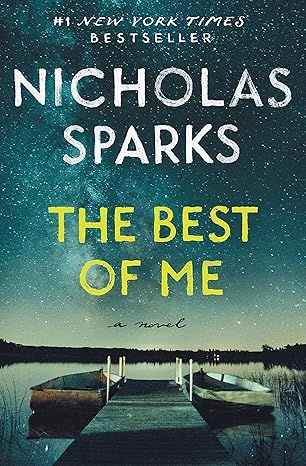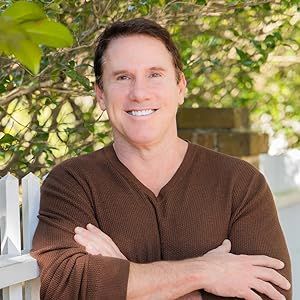The Best of Me
4.5
-
18,103 ratings
In this #1 New York Times bestselling novel of first love and second chances, former high school sweethearts confront the painful truths of their past to build a promising future—together.
"Everyone wanted to believe that endless love was possible. She'd believed in it once, too, back when she was eighteen."
In the spring of 1984, high school students Amanda Collier and Dawson Cole fell deeply, irrevocably in love. Though they were from opposite sides of the tracks, their love for one another seemed to defy the realities of life in their small town in North Carolina. But as the summer of their senior year came to a close, unforeseen events would tear the young couple apart, setting them on radically divergent paths.
Now, twenty-five years later, Amanda and Dawson are summoned back home for the funeral of Tuck Hostetler, the mentor who once gave shelter to their high school romance. Neither has lived the life they imagined . . . and neither can forget the passionate first love that forever changed their lives. As Amanda and Dawson carry out the instructions Tuck left behind for them, they realize that everything they thought they knew—about Tuck, about themselves, and about the dreams they held dear—was not as it seemed.
Forced to confront painful memories, the former lovers will discover undeniable truths about the choices they have made. And in the course of a single, searing weekend, they will ask of the living, and the dead: Can love truly rewrite the past?
Kindle
$8.99
Available instantly
Audiobook
$0.99
with membership trial
Hardcover
$25.31
Paperback
$9.52
Ships from
Amazon.com
Payment
Secure transaction
ISBN-10
1538764725
ISBN-13
978-1538764725
Print length
336 pages
Language
English
Publisher
Grand Central Publishing
Publication date
December 14, 2020
Dimensions
5.2 x 1.15 x 7.95 inches
Item weight
9.6 ounces
Popular highlights in this book
Love, after all, always said more about those who felt it than it did about the ones they loved.
Highlighted by 2,221 Kindle readers
Life was messy. Always had been and always would be and that was just the way it was, so why bother complaining? You either did something about it or you didn’t, and then you lived with the choice you made.
Highlighted by 1,660 Kindle readers
You might not understand, but I gave you the best of me, and after you left, nothing was ever the same.
Highlighted by 1,334 Kindle readers
It takes a long time to grow an old friend, and trust is built a single moment at a time.
Highlighted by 1,122 Kindle readers
The past can be escaped only by embracing something better, and he figured that was what she’d done.
Highlighted by 1,027 Kindle readers
Product details
ASIN :
B004QZ9PLU
File size :
3011 KB
Text-to-speech :
Enabled
Screen reader :
Supported
Enhanced typesetting :
Enabled
X-Ray :
Enabled
Word wise :
Enabled
Editorial reviews
Review
"A beautifully written romance novel that will pull at all the appropriate heartstrings and leave you speechless."―The Guardian
"Sparks's ability to capture the truths of this affair makes the story both heartfelt and heartbreaking. It's quite possibly his best work in years"―Publishers Weekly
About the Author
With over 100 million copies of his books sold, Nicholas Sparks is one of the world's most beloved storytellers. His novels include sixteen #1 New York Times bestsellers, and all of his books, including Three Weeks with My Brother, the memoir he wrote with his brother, Micah, have been New York Times and international bestsellers, and were translated into more than fifty languages. Eleven of Nicholas Sparks's novels—The Choice, The Longest Ride, The Best of Me, Safe Haven, The Lucky One, The Last Song, Dear John, Nights in Rodanthe, The Notebook, A Walk to Remember, and Message in a Bottle—have been adapted into major motion pictures.
Sample
Excerpt. © Reprinted by permission. All rights reserved.
The Best of Me By Nicholas Sparks
1
For Dawson Cole, the hallucinations began after the explosion on the platform, on the day he should have died.
In the fourteen years he’d worked on oil rigs, he thought he’d seen it all. In 1997, he’d watched as a helicopter lost control as it was about to land. It crashed onto the deck, erupting in a blistering fireball, and he’d received second-degree burns on his back as he’d attempted a rescue. Thirteen people, most of them in the helicopter at the time, had died. Four years later, after a crane on the platform collapsed, a piece of flying metal debris the size of a basketball nearly took his head off. In 2004, he was one of the few workers remaining on the rig when Hurricane Ivan slammed into it, with winds gusting over a hundred miles an hour and waves large enough to make him wonder whether to grab a parachute in case the rig collapsed. But there were other dangers as well. People slipped, parts snapped, and cuts and bruises were a way of life among the crew. Dawson had seen more broken bones than he could count, two plagues of food poisoning that sickened the entire crew, and two years ago, in 2007, he’d watched a supply ship start to sink as it pulled away from the rig, only to be rescued at the last minute by a nearby coast guard cutter.
But the explosion was something different. Because there was no oil leak—in this instance, the safety mechanisms and their backups prevented a major spill—the story barely made the national news and was largely forgotten within a few days. But for those who were there, including him, it was the stuff of nightmares. Up until that point, the morning had been routine. He’d been monitoring the pumping stations when one of the oil storage tanks suddenly exploded. Before he could even process what had happened, the impact from the explosion sent him crashing into a neighboring shed. After that, fire was everywhere. The entire platform, crusted with grease and oil, quickly became an inferno that engulfed the whole facility. Two more large explosions rocked the rig even more violently. Dawson remembered dragging a few bodies farther from the fire, but a fourth explosion, bigger than the others, launched him into the air a second time. He had a vague memory of falling toward the water, a fall that for all intents and purposes should have killed him. The next thing he knew, he was floating in the Gulf of Mexico, roughly ninety miles south of Vermilion Bay, Louisiana.
Like most of the others, he hadn’t had time to don his survival suit or reach for a flotation device, but in between swells he saw a dark-haired man waving in the distance, as if signaling Dawson to swim toward him. Dawson struck out in that direction, fighting the ocean waves, exhausted and dizzy. His clothes and boots dragged him down, and as his arms and legs began to give out he knew he was going to die. He thought he’d been getting close, though the swells made it impossible to know for sure. At that moment, he spotted a lone life preserver floating among some nearby debris. Using the last of his remaining strength, he latched on. Later, he learned that he was in the water for almost four hours and had drifted nearly a mile from the rig before being picked up by a supply ship that had rushed to the scene. He was pulled on board, carried belowdecks, and reunited with other survivors. Dawson was shivering from hypothermia, and he was dazed. Though his vision was blurred—he was later diagnosed with a moderate concussion—he recognized how lucky he’d been. He saw men with vicious burns on their arms and shoulders, and others bleeding from their ears or nursing broken bones. He knew most of them by name. There were only so many places for people to go on the rig—it was essentially a small village in the middle of the ocean—and everyone made it to the cafeteria or the recreation room or gym sooner or later. One man, however, looked only vaguely familiar, a man who seemed to be staring at him from across the crowded room. Dark-haired and maybe forty years old, he was wearing a blue windbreaker that someone on the ship had probably lent him. Dawson thought he looked out of place, more like an office worker than a roughneck. The man waved, suddenly triggering memories of the figure he’d spotted earlier in the water—it was him—and all at once, Dawson felt the hairs on the back of his neck rise. Before he could identify the source of his unease, a blanket was thrown over his shoulders and he was ushered to a spot in the corner where a medical officer waited to examine him.
By the time he sat back down, the dark-haired man was gone.
Over the next hour, more survivors were brought aboard, but as his body began to warm, Dawson started to wonder about the rest of the crew. Men he’d worked with for years were nowhere to be seen. Later, he would learn that twenty-four people were killed. Most, but not all, of the bodies were eventually found. While he recovered in the hospital, Dawson couldn’t stop thinking about the fact that some families had no real way to say good-bye.
He’d had trouble sleeping since the explosion, not because of any nightmares but because he couldn’t shake the feeling of being watched. He felt… haunted, as ridiculous as that sounded. Day and night, he occasionally caught a glimpse of movement from the corner of his eye, but whenever he turned there was never anyone or anything there that could explain it. He wondered if he was losing his mind. The doctor suggested he was having a posttraumatic reaction to the stress of the accident and that his brain might still be healing from the concussion. It made sense and sounded logical, but it didn’t feel right to Dawson. He nodded anyway. The doctor gave him a prescription for sleeping pills, but Dawson never bothered to fill it.
He was given a paid leave of absence for six months while the legal wheels began to grind. Three weeks later, the company offered him a settlement and he signed the papers. By then he’d already been contacted by a half-dozen attorneys, all of them racing to be the first to file a class action suit, but he didn’t want the hassle. He took the settlement offer and deposited the check on the day it arrived. With enough money in his account to make some people think he was rich, he went to his bank and wired most of it to an account in the Cayman Islands. From there, it was forwarded to a corporate account in Panama that had been opened with minimal paperwork, before being wired to its final destination. The money, as always, was virtually impossible to trace.
He’d kept only enough for the rent and a few other expenses. He didn’t need much. Nor did he want much. He lived in a single-wide trailer at the end of a dirt road on the outskirts of New Orleans, and people who saw it probably assumed that its primary redeeming feature was that it hadn’t flooded during Hurricane Katrina in 2005. With plastic siding that was cracked and fading, the trailer squatted on stacked cinder blocks, a temporary foundation that had somehow become permanent over time. It had a single bedroom and bath, a cramped living area, and a kitchen with barely enough room to house a mini refrigerator. Insulation was almost nonexistent, and humidity had warped the floors over the years, making it seem as if he were always walking on a slant. The linoleum in the kitchen was cracking in the corners, the minimal carpet was threadbare, and he’d furnished the narrow space with items he’d picked up over the years at thrift stores. Not a single photograph adorned the walls. Though he’d lived there for almost fifteen years, it was less a home than a place where he happened to eat and sleep and take his showers.
Despite its age, it was almost always as pristine as the homes in the Garden District. Dawson was, and always had been, a bit of a neat freak. Twice a year, he repaired cracks and caulked seams to keep rodents and insects at bay, and whenever he prepared to return to the rig, he scrubbed the kitchen and bathroom floors with disinfectant and emptied the cupboards of anything that might spoil or mold. He generally worked thirty days on, followed by thirty days off, and anything that wasn’t in a can would go bad in less than a week, especially during the summer. Upon his return, he scrubbed the place from top to bottom again while airing it out, doing his best to get rid of the musty smell.
It was quiet, though, and that was really all he needed. He was a quarter mile off the main road, and the nearest neighbor was even farther away than that. After a month on the rig, that was exactly what he wanted. One of the things he’d never gotten used to on the rig was the endless noise. Unnatural noise. From cranes continually repositioning supplies to helicopters to the pumps to the endless pounding of metal on metal, the cacophony never stopped. Rigs pumped oil around the clock, which meant that even when Dawson was trying to sleep, the clamor continued. He tried to tune it out while he was there, but whenever he returned to the trailer he was struck by the almost impenetrable silence when the sun was high in the sky. In the mornings he could hear birdsong drifting from the trees, and in the evenings he’d listen to the way the crickets and frogs sometimes synchronized their rhythm a few minutes after the sun went down. It was usually soothing, but every now and then the sound made him think of home, and when that happened he would retreat indoors, forcing the memories away. Instead, he tried to focus on the simple routines that dominated his life when he was back on solid ground.
He ate. He slept. He ran and lifted weights and tinkered on his car. He took long, wandering drives, going nowhere in particular. Now and then he went fishing. He read every night and wrote an occasional letter to Tuck Hostetler. That was it. He owned neither a television nor a radio, and though he had a cell phone, only work numbers were listed in the contact list. He picked up groceries and essentials and stopped at the bookstore once a month, but other than that he never ventured into New Orleans. In fourteen years, he’d never been to Bourbon Street or strolled through the French Quarter; he’d never sipped coffee at the Café Du Monde or had a hurricane at Lafitte’s Blacksmith Shop Bar. Instead of visiting a gym, he worked out behind the trailer beneath a weathered tarp he’d strung between his home and nearby trees. He didn’t go to the movies or kick back at a friend’s place while the Saints played on Sunday afternoons. He was forty-two years old and hadn’t been on a date since he was a teenager.
Most people wouldn’t or couldn’t have lived their lives that way, but they didn’t know him. They didn’t know who he had been or what he had done, and he wanted to keep it that way.
Then, out of the blue on a warm afternoon in mid-June, he received a phone call, and memories of the past rose anew. Dawson had been on leave for almost nine weeks. For the first time in nearly twenty years, he was finally going home. The thought made him uneasy, but he knew he had no choice. Tuck had been more than just a friend; he’d been like a father. And in the silence, as he reflected on the year that had been the turning point of his life, Dawson saw a flash of movement once more. When he turned, there was nothing there at all, and he wondered again whether he was going crazy.
The call had come from Morgan Tanner, an attorney in Oriental, North Carolina, who informed him that Tuck Hostetler had passed away. “There are arrangements best handled in person,” Tanner explained. Dawson’s first instinct after hanging up was to book his flight and a room at a local bed-and-breakfast, then call a florist and arrange for a delivery.
The following morning, after locking the front door to the trailer, Dawson walked around back, toward the tin shed where he kept his car. It was Thursday, June 18, 2009, and he carried with him the only suit he owned and a duffel bag he’d packed in the middle of the night when he hadn’t been able to sleep. He unlocked the padlock and rolled up the door, watching sunlight stream onto the car he’d been restoring and repairing ever since high school. It was a 1969 fastback, the kind of car that turned heads when Nixon was president and still turned heads today. It looked as if it had just rolled off the assembly line, and over the years countless strangers had offered to buy it from him. Dawson had turned them down. “It’s more than just a car,” he told them, without further explanation. Tuck would have understood exactly what he meant.
Dawson tossed the duffel bag onto the passenger seat and laid the suit on top of it before sliding behind the wheel. When he turned the key, the engine came to life with a loud rumble, and he eased the car onto the gravel before hopping out to lock the shed. As he did, he ran through a mental checklist, making sure he had everything. Two minutes later, he was on the main road, and a half hour after that he was parking in the long-term lot at the New Orleans airport. He hated leaving the car but had no choice. He collected his things before starting toward the terminal, where a ticket was waiting for him at the airline counter.
The airport was crowded. Men and women walking arm in arm, families off to visit grandparents or Disney World, students shuttling between home and school. Business travelers rolled their carry-ons behind them, jabbering on cell phones. He stood in the slow-moving line and waited until a spot opened at the counter. He showed his identification and answered the basic security questions before being handed his boarding passes. There was a single layover in Charlotte, a little more than an hour. Not bad. Once he landed in New Bern and picked up his rental car, he had another forty minutes on the road. Assuming there weren’t any delays, he’d be in Oriental by late afternoon.
Until he took his seat on the plane, Dawson hadn’t realized how tired he was. He wasn’t sure what time he’d finally fallen asleep—the last time he’d checked, it had been almost four—but he figured he’d sleep on the plane. Besides, it wasn’t as though he had much to do once he got to town. He was an only child, his mom had run off when he was three, and his dad had done the world a favor by drinking himself to death. Dawson hadn’t talked to anyone in his family in years, nor did he intend to renew their acquaintance now.
Quick trip, in and out. He’d do what he had to do and didn’t plan on hanging around any longer than he had to. He might have been raised in Oriental, but he’d never really belonged there. The Oriental he knew was nothing like the cheery image advertised by the area Visitors’ Bureau. For most people who spent an afternoon there, Oriental came across as a quirky little town, popular with artists and poets and retirees who wanted nothing more than to spend their twilight years sailing on the Neuse River. It had the requisite quaint downtown, complete with antiques stores, art galleries, and coffee shops, and the place had more weekly festivals than seemed possible for a town of fewer than a thousand people. But the real Oriental, the one he’d known as a child and young man, was the one inhabited by families with ancestors who had resided in the area since colonial times. People like Judge McCall and Sheriff Harris, Eugenia Wilcox, and the Collier and Bennett families. They were the ones who’d always owned the land and farmed the crops and sold the timber and established the businesses; they were the powerful, invisible undercurrent in a town that had always been theirs. And they kept it the way they wanted.
Dawson found that out firsthand when he was eighteen, and then again at twenty-three, when he finally left for good. It wasn’t easy being a Cole anywhere in Pamlico County, Oriental in particular. As far as he knew, every Cole in the family tree going back as far as his great-grandfather had spent time in prison. Various members of the family had been convicted of everything from assault and battery to arson, attempted murder, and murder itself, and the rocky, wooded homestead that housed the extended family was like a country with its own rules. A handful of ramshackle cabins, single-wide trailers, and junk barns dotted the property that his family called home, and unless he had no choice, even the sheriff avoided the place. Hunters gave the land a wide berth, rightly assuming that the TRESPASSERS WILL BE SHOT ON SIGHT sign wasn’t simply a warning but a promise. The Coles were moonshiners and drug dealers, alcoholics, wife beaters, abusive fathers and mothers, thieves and pimps, and above all, pathologically violent. According to an article that had been published in a now defunct magazine, they were at one point regarded as the most vicious, revenge-driven family east of Raleigh. Dawson’s father was no exception. He’d spent most of his twenties and early thirties in prison for various offenses that included stabbing a man with an ice pick after the man had cut him off in traffic. He’d been tried and acquitted twice for murder after witnesses had vanished, and even the rest of the family knew enough not to rile him up. How or why his mom had ever married him was a question that Dawson couldn’t begin to answer. He didn’t blame his mom for running off. For most of his childhood, he’d wanted to run off, too. Nor did he blame her for not taking him. Men in the Cole family were strangely proprietary about their offspring, and he had no doubt his father would have hunted his mom down and taken him back anyway. He’d told Dawson as much more than once, and Dawson had known better than to ask his dad what he would have done had his mom refused to give him up. Dawson already knew the answer.
He wondered how many members of his family were still living on the land. When he’d finally left, in addition to his father, there’d been a grandfather, four uncles, three aunts, and sixteen cousins. By now, with the cousins grown up and having kids of their own, there were probably more, but he had no desire to find out. That might have been the world he’d grown up in, but like Oriental, he’d never really belonged to them, either. Maybe his mom, whoever she was, had something to do with it, but he wasn’t like them. Alone among his cousins, he never got in fights at school and he pulled down decent grades. He stayed away from the drugs and the booze, and as a teenager he avoided his cousins when they cruised into town looking for trouble, usually telling them that he had to check on the still or help disassemble a car that someone in the family had stolen. He kept his head down and did his best to maintain as low a profile as he could.
It was a balancing act. The Coles might have been a band of criminals, but that didn’t mean they were stupid, and Dawson knew instinctively that he had to hide his differences as best he could. He was probably the only kid in his school’s history who studied hard enough to fail a test on purpose, and he taught himself how to doctor his report cards so they appeared worse than they really were. He learned how to secretly empty a can of beer the moment someone had his back turned by poking it with a knife, and when he used work as an excuse to avoid his cousins, he often toiled until the middle of the night. That was successful for a while, but over time, cracks appeared in the facade. One of his teachers mentioned to a drinking buddy of his dad’s that he was the best student in his class; aunts and uncles began to notice that he alone among the cousins was staying within the bounds of the law. In a family that prized loyalty and conformity above all else, he was different, and there was no worse sin.
It infuriated his father. Though he’d been beaten regularly since he was a toddler—his father favored belts and straps—by the time he was twelve the beatings became personal. His father would beat him until Dawson’s back and chest were black and blue, then return an hour later, turning his attention to the boy’s face and legs. Teachers knew what was happening, but, afraid for their own families, they ignored it. The sheriff pretended that he couldn’t see the bruises and welts as Dawson walked home from school. The rest of the family had no problem with it. Abee and Crazy Ted, his older cousins, jumped him more than once, beating him as bad as his father—Abee because he thought Dawson had it coming, Crazy Ted just for the hell of it. Abee, tall and broad with fists the size of ham bones, was violent and short-tempered but smarter than he let on. Crazy Ted, on the other hand, was born mean. In kindergarten, he stabbed a classmate with a pencil in a fight over a Twinkie, and before he was finally expelled in the fifth grade he’d sent another classmate to the hospital. Rumor had it that he’d killed a junkie while still a teenager. Dawson figured out it was best not to fight back. Instead, he learned to cover up while absorbing the blows, until his cousins finally grew bored or tired or both.
He didn’t, however, follow in the family business and grew more resolute that he never would. Over time, he learned that the more he screamed, the more his father beat him, so he kept his mouth shut. As violent as his father was, he was also a bully, and Dawson knew instinctively that bullies fought only the battles they knew they could win. He knew there would come a time when he’d be strong enough to fight back, when he would no longer be afraid of his father. As the blows rained down on him, he tried to imagine the courage his mom had shown by cutting all ties to the family.
He did his best to hasten the process. He tied a sack filled with rags to a tree and punched it for hours a day. He hefted rocks and engine parts as often as he could. He did pull-ups, push-ups, and sit-ups throughout the day. He put on ten pounds of muscle before turning thirteen, and another twenty by fourteen. He was growing taller as well. By fifteen, he was nearly as tall as his father. One night, a month after he turned sixteen, his father came at him with a belt after a night of drinking, and Dawson reared up and ripped it from his father’s grasp. He told his father that if he ever touched him again, he’d kill him.
That night, with nowhere else to go, he took refuge in Tuck’s garage. When Tuck found him the following morning, Dawson asked him for a job. There was no reason for him to help Dawson, who was not only a stranger but a Cole as well. Tuck wiped his hands on the bandanna he kept in his back pocket, trying to read him before reaching for his cigarettes. At the time, he was sixty-one years old, a widower for two years. When he spoke, Dawson could smell the alcohol on his breath, and his voice was raspy with the residue of the unfiltered Camels he’d been smoking since he was a child. His accent, like Dawson’s, was pure country.
“I figure you can strip ’em, but you know anythin’ about puttin’ ’em back again?”
“Yes, sir,” Dawson had answered.
“You got schoolin’ today?”
“Yes, sir.”
“Then you be back here right afterwards and I’ll see how you do.”
Dawson showed up and did his best to prove his worth. After work, it rained most of the evening, and when Dawson sneaked back into the garage to take refuge from the storm, Tuck was waiting for him.
Tuck didn’t say anything. Instead, he drew hard on his Camel, squinting at Dawson without speaking, and eventually went back into the house. Dawson never spent another night on the family land. Tuck didn’t make him pay rent and Dawson bought his own food. As the months rolled on, he began to think about the future for the first time in his life. He saved as much as he could, splurging only to buy the fastback from a junkyard and gallon-size jugs of sweet tea from the diner. He repaired the car in the evenings after work while drinking the tea, and he fantasized about going to college, something no Cole had ever done. He considered joining the military or just renting his own place, but before he could make any decisions his father showed up unexpectedly at the garage. He’d brought Crazy Ted and Abee with him. Both of them carried baseball bats, and he could see the outline of a knife in Ted’s pocket.
“Gimme the money you been earning,” his father said without preamble.
“No,” Dawson answered.
“I knew you’d say that, boy. That’s why I got Ted and Abee here. They can beat it out of you and I’ll take it anyway, or you can gimme what you owe for running off.”
Dawson said nothing. His father picked at his gums with a toothpick.
“See, all it would take for me to end this little life of yours is a crime out there in town. Maybe a burglary, maybe a fire. Who knows? After that, we just plant some evidence, place an anonymous call to the sheriff, and let the law do the work. You’re alone out here at night and you ain’t gonna have no alibi, and for all I care, you can just rot away for the rest of your life surrounded by iron and concrete. Won’t bother me none at all. So why don’t you just hand it over?”
Dawson knew his father wasn’t bluffing. Keeping his face expressionless, he took the money from his wallet. After his father counted the bills, he spat the toothpick onto the ground and grinned.
“I’ll be back next week.”
Dawson made do. He managed to squirrel away a little bit of the money he earned to continue his repairs on the Fastback and buy the sweet tea, but most of his money went to his father. Though he suspected that Tuck knew what was going on, Tuck never said anything directly to him. Not because he was afraid of the Coles, but because it wasn’t his business. Instead, he began cooking dinners that were just a bit too large for him to eat on his own. “Got some left, if you want it,” he’d say after walking a plate out to the garage. More often than not, he’d go back inside without another word. That was the kind of relationship they had, and Dawson respected it. Dawson respected Tuck. In his own way, Tuck had become the most important person in his life, and Dawson couldn’t imagine anything that would change that.
Until the day Amanda Collier entered his world.
Though he’d known of Amanda for years—there was only one high school in Pamlico County and he’d gone to school with her most of his life—it wasn’t until the spring of his junior year that they exchanged more than a few words for the first time. He always thought she was pretty, but he wasn’t alone in that. She was popular, the kind of girl who sat surrounded by friends at a table in the cafeteria while boys vied for her attention, and she was not only class president but a cheerleader as well. Throw in the fact that she was rich, and she was as inaccessible to him as an actress on television. He never said a word to her until they were finally paired as lab partners in chemistry.
As they labored over test tubes and studied together for tests that semester, he realized that she was nothing like he’d imagined she would be. First, that she was a Collier and he a Cole seemed to make no difference to her, which surprised him. She had a quick, unbridled laugh, and when she smiled there was a mischievous hint about it, as though she knew something that no one else did. Her hair was a rich honey blond, her eyes the color of warm summer skies, and sometimes as they scribbled equations into their notebooks, she would touch his arm to get his attention and the feeling would linger for hours. In the afternoons, as he worked in the garage, he often found he couldn’t stop thinking about her. It took him until spring before he finally worked up the courage to ask if he could buy her an ice cream, and as the end of the school year approached they began to spend more and more time together.
That was 1984, and he was seventeen years old. By the time summer ended, he knew he was in love, and when the air turned crisp and autumn leaves drifted to the ground in ribbons of red and yellow, he was certain that he wanted to spend the rest of his life with her, as crazy as that sounded. They stayed together the following year, growing even closer and spending every possible moment together. With Amanda, it was easy for him to be himself; with Amanda, he was content for the first time in his life. Even now, that final year together was sometimes all he could think about.
Or more accurately, Amanda was all he could think about.
On the airplane, Dawson settled into the flight. He had a window seat about halfway back, next to a young woman: red hair, midthirties, long-limbed, and tall. Not exactly his type, but pretty enough. She leaned into him as she searched for her seat belt and smiled in apology.
Dawson nodded, but sensing that she was about to strike up a conversation, he stared out the window. He watched the luggage cart pull away from the aircraft, drifting as he often did into distant memories of Amanda. He pictured the times they went swimming in the Neuse that first summer, their bodies slick as they brushed up against each other; or how she used to perch on the bench while he worked on his car in Tuck’s garage, arms wrapped around her drawn-up knees, making him think that he wanted nothing more than to see her sitting just like that forever. In August, when he finally got his car to run for the first time, he took her to the beach. There they lay on their towels, fingers intertwined as they talked of their favorite books, the movies they enjoyed, their secrets and dreams for the future.
They argued as well, and then Dawson caught a glimpse of her fiery nature. Their disagreements weren’t constant, but they weren’t infrequent, either; remarkably, no matter how quickly things flared up, they almost always ended equally fast. Sometimes it was about little things—Amanda was nothing if not opinionated—and they’d bicker furiously for a while, usually without any sort of resolution. Even in those instances where he became truly angry, he couldn’t help admiring her honesty, an honesty rooted in the fact that she cared more about him than anyone else in his life.
Aside from Tuck, no one understood what she saw in him. Though they initially tried to conceal the relationship, Oriental was a small town, and people inevitably began to whisper. One by one, her friends withdrew, and it was only a matter of time before her parents found out. He was a Cole and she was a Collier, and that was more than enough cause for dismay. At first, they clung to the hope that Amanda was simply going through a rebellious phase, and they tried to ignore it. When that didn’t work, things got harder for Amanda. They took away her driver’s license and prohibited her from using the phone. In the fall, she was grounded for weeks at a time and forbidden to go out on weekends. Never once was Dawson allowed into their home, and the only time her father ever spoke to him he called Dawson “a worthless piece of white trash.” Her mother begged Amanda to end it, and by December her father had stopped speaking to her altogether.
The hostility surrounding them only drew Amanda and Dawson closer together, and when Dawson began to take her hand in public, Amanda held tight, daring anyone to tell her to let go. But Dawson wasn’t naive; as much as she meant to him, he always had the sense that they were on borrowed time. Everything and everyone seemed stacked against them. When his father found out about Amanda, he would ask about her when he came by to collect Dawson’s wages. Though there was nothing overtly menacing in his tone, simply hearing him say her name left Dawson feeling sick to his stomach.
In January, she turned eighteen, but as furious as her parents were about the relationship, they stopped short of throwing her out of the house. By then Amanda didn’t care what they thought—or at least that was what she always told Dawson. Sometimes, after yet another bitter argument with her parents, she would sneak out her bedroom window in the middle of the night and strike out for the garage. Often he would be waiting for her, but sometimes he’d awaken to her nudging him as she joined him on the mat he’d unrolled on the floor of the garage office. They’d wander down to the creek and Dawson would slip his arm around her while they sat on one of the low-slung branches of an ancient live oak. In the moonlight, as the mullets were jumping, Amanda would rehash her arguments with her parents, sometimes with a quaking voice and always careful to protect his feelings. He loved her for that, but he knew exactly how her parents felt about him. One evening, while tears spilled from beneath her lids after yet another argument, he gently suggested that it might be better for her if they stopped seeing each other.
“Is that what you want?” she whispered, her voice ragged.
He pulled her closer, slipping his arms around her. “I just want you to be happy,” he whispered.
She’d leaned into him then, resting her head on his shoulder. As he held her, he’d never hated himself more for being born a Cole.
“I’m happiest when I’m with you,” she finally murmured.
Later that night they made love for the first time. And for the next two decades and beyond, he carried those words and the memories of that night inside him, knowing that she had been speaking for them both.
After landing in Charlotte, Dawson flung his duffel bag and suit over his shoulder and walked through the terminal, barely registering the activity around him as he sifted through memories of his final summer with Amanda. That spring, she’d received notice of her acceptance to Duke, a dream of hers since she’d been a little girl. The specter of her departure, coupled with the isolation from her family and friends, only intensified their desire to pass as much time together as possible. They spent hours at the beach and took long drives while the radio blasted, or they simply hung around Tuck’s garage. They swore little would change after she left; either he’d drive to Durham or she’d come back to visit. Amanda had no doubt that they’d find a way to somehow make it work.
Her parents, however, had other plans. On a Saturday morning in August, a little more than a week before she was supposed to leave for Durham, they cornered her before she was able to escape the house. Her mom did all the talking, though she knew her father stood firmly in agreement.
“This has gone on long enough,” her mother began, and in a voice that was surprisingly calm, she told Amanda that if she continued to see Dawson, she would have to move out of the house in September and start paying her own bills, and they wouldn’t pay for her to attend college, either. “Why should we waste money on college when you’re throwing your life away?”
When Amanda started to protest, her mother talked right over her.
“He’ll drag you down, Amanda, but right now you’re too young to understand that. So if you want the freedom of being an adult, you’ll also have to assume the responsibilities. Ruin your life by staying with Dawson—we’re not going to stop you. But we’re not going to help you, either.”
Amanda ran straight out of the house, her only thought to find Dawson. By the time she reached the garage, she was crying so hard she couldn’t speak. Dawson held her close, letting bits and pieces of the story trickle out as her sobs finally subsided.
“We’ll move in together,” she said, her cheeks still damp.
“Where?” he asked her. “Here? In the garage?”
“I don’t know. We’ll figure it out.”
Dawson remained silent, studying the floor. “You need to go to college,” he finally told her.
“I don’t care about college,” Amanda protested. “I care about you.”
He let his arms fall to his sides. “I care about you, too. And that’s why I can’t take this from you,” he said.
She shook her head, bewildered. “You’re not taking anything from me. It’s my parents. They’re treating me like I’m still a little girl.”
“It’s because of me, and we both know that.” He kicked at the dirt. “If you love someone, you’re supposed to let them go, right?”
For the first time, her eyes flashed. “And if they come back, it’s meant to be? Is that what you think this is? Some sort of cliché?” She grabbed his arm, her fingers digging into him. “We’re not a cliché,” she said. “We’ll find a way to make it work. I can get a job as a waitress or whatever, and we can rent a place.”
He kept his voice calm, willing it not to break. “How? You think my dad is going to stop what he’s doing?”
“We can move somewhere else.”
“Where? With what? I have nothing. Don’t you understand that?” He let the words hang, and when she didn’t answer, he finally went on. “I’m just trying to be realistic. This is your life we’re talking about. And… I can’t be part of it anymore.”
“What are you saying?”
“I’m saying your parents are right.”
“You don’t mean that.”
In her voice, he heard something almost like fear. Though he yearned to hold her, he took a deliberate step backward. “Go home,” he said.
She moved toward him. “Dawson—”
“No!” he snapped, taking a quick step away. “You’re not listening. It’s over, okay? We tried, it didn’t work. Life moves on.”
Her expression turned waxy, almost lifeless. “So that’s it?”
Instead of answering, he forced himself to turn away and walk toward the garage. He knew that if he so much as glanced at her he’d change his mind, and he couldn’t do that to her. He wouldn’t do that to her. He ducked under the open hood of the fastback, refusing to let her see his tears.
When she finally left, Dawson slid to the dusty concrete floor next to his car, remaining there for hours, until Tuck finally came out and took a seat beside him. For a long time, he was silent.
“You ended it,” Tuck finally said.
“I had to.” Dawson could barely speak.
“Yep.” He nodded. “Heard that, too.”
The sun was climbing high overhead, blanketing everything outside the garage with a stillness that felt almost like death.
“Did I do the right thing?”
Tuck reached into his pocket and pulled out his cigarettes, buying time before he answered. He tapped out a Camel.
“Don’t know. There’s a lot of magic between you, ain’t no denying that. And magic makes forgettin’ hard.” Tuck patted him on the back and got up to leave. It was more than he’d ever said to Dawson about Amanda. As he walked away, Dawson squinted into the sunlight and the tears started again. He knew that Amanda would always be the very best part of him, the self he would always long to know.
What he didn’t know was that he would not see or speak to her again. The following week Amanda moved into the dorms at Duke University, and a month after that Dawson was arrested.
He spent the next four years behind bars.
Read more
About the authors
Nicholas Sparks
Nicholas Sparks is one of the world’s most beloved storytellers. All of his books have been New York Times bestsellers, with over 130 million copies sold worldwide, in more than 50 languages, including over 92 million copies in the United States alone.
Eleven of Nicholas Sparks's novels—The Choice, The Longest Ride, The Best of Me, Safe Haven, The Lucky One, The Last Song, Dear John, Nights in Rodanthe, The Notebook, A Walk to Remember, and Message in a Bottle—have been adapted into major motion pictures. The Notebook has also been adapted into a Broadway musical, featuring music and lyrics by Ingrid Michaelson.
Read more
Reviews
Customer reviews
4.5 out of 5
18,103 global ratings
Teresa Oxford
5
Great book
Reviewed in the United States on August 28, 2024
Verified Purchase
WOW, great book. Loved the story line. I knew where the ending was going, but didn’t want it to be true.
Byrnie
5
I couldn’t put it down
Reviewed in the United States on July 7, 2024
Verified Purchase
I loved this book. The storytelling kept my interest. I don’t think I have read an entire novel as quickly as I did this one. It had everything: love, action, tragedy, compassion, forgiveness… The romantic thread was beautiful and dreamlike. Mr. Sparks adeptly floats the love story along as delicately as gossamer amidst the harsh events that were occurring that kept me wanting the story to go otherwise. Truly an example of not always getting what you want, but rather what you need.
Read more
M. Alvarado
5
Gutwrenching
Reviewed in the United States on August 26, 2024
Verified Purchase
I have always loved all of Nikolas Sparks books but this one was definitely outstanding and gut wrenching , and throughout the whole reading process you never wanted to stop until the end.. My congratulations.
Top Nicholas Sparks titles
View all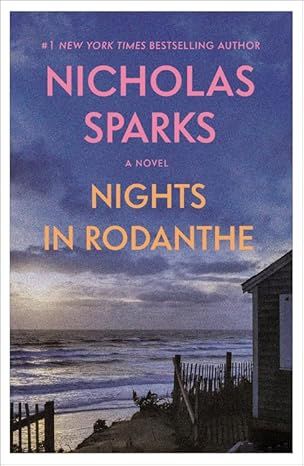
Nights in Rodanthe
4.6
-
3,717
$0.99
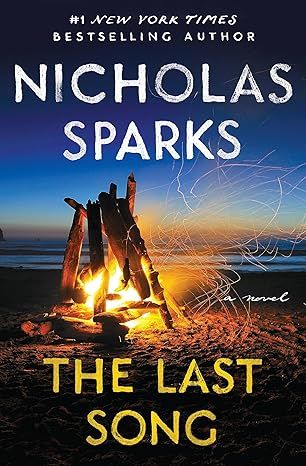
The Last Song
4.6
-
7,035
$0.99
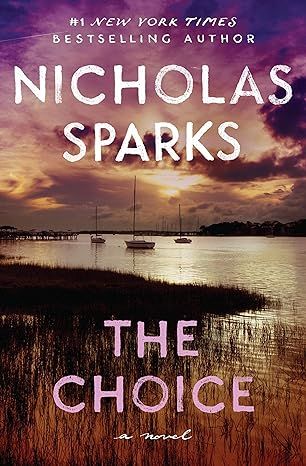
The Choice
4.4
-
22,262
$0.99
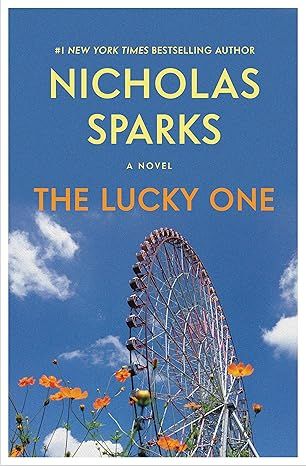
The Lucky One
4.6
-
8,044
$0.99
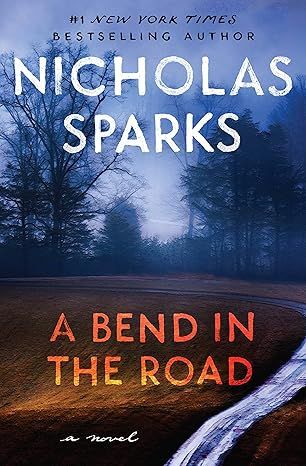
A Bend in the Road
4.6
-
9,069
$0.99
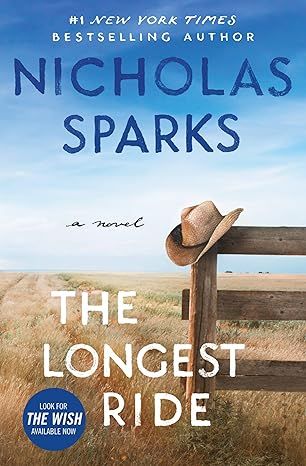
The Longest Ride
4.6
-
31,183
$0.99
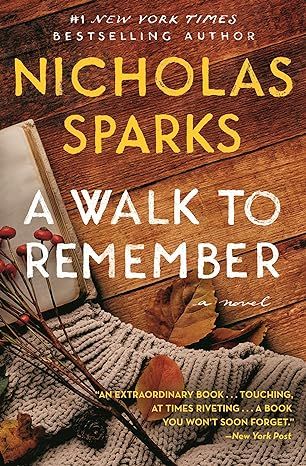
A Walk to Remember
4.6
-
11,841
$0.99
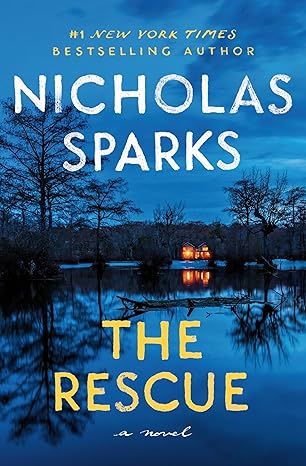
Rescue
4.5
-
25,514
$0.99
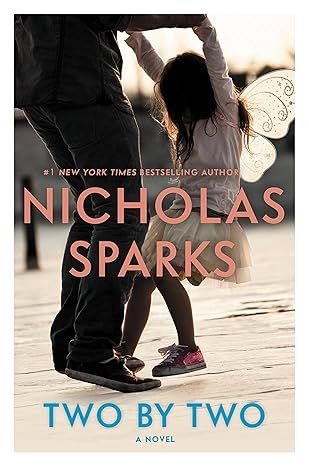
Two by Two
4.4
-
28,575
$0.99
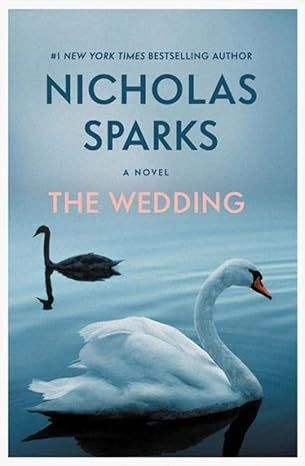
The Wedding
4.6
-
11,893
$0.99
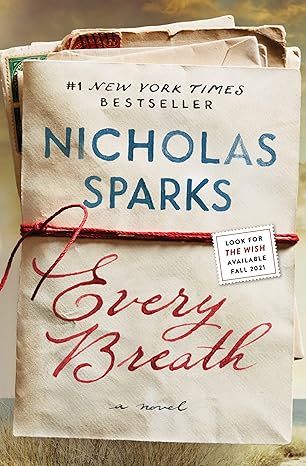
Every Breath
4.6
-
35,865
$0.99
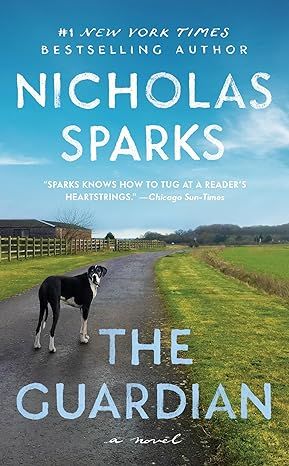
The Guardian
4.5
-
12,153
$0.99
Similar Books
Best sellers
View all
The Tuscan Child
4.2
-
100,022
$8.39

The Thursday Murder Club: A Novel (A Thursday Murder Club Mystery)
4.3
-
155,575
$6.33

Sapiens: A Brief History of Humankind
4.6
-
140,302
$13.49

The Butterfly Garden (The Collector, 1)
4.3
-
88,556
$9.59

Things We Hide from the Light (Knockemout Series, 2)
4.4
-
94,890
$11.66

The Last Thing He Told Me: A Novel
4.3
-
154,085
$2.99

The Perfect Marriage: A Completely Gripping Psychological Suspense
4.3
-
143,196
$9.47

The Coworker
4.1
-
80,003
$13.48

First Lie Wins: A Novel (Random House Large Print)
4.3
-
54,062
$14.99

Mile High (Windy City Series Book 1)
4.4
-
59,745
$16.19

Layla
4.2
-
107,613
$8.99

The Locked Door
4.4
-
94,673
$8.53
